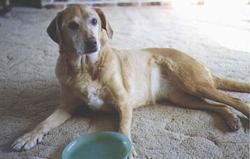  February
came and Gretchen suddenly took a turn for the worse. She wasn't interested
in playing frisbee and she was in horrible pain, refusing to eat or go
outside. She laid around, and had a pained expression on her face all the
time. What bothered me most was the obvious atrophy of her left shoulder
area. Always stoic, upon palpation, she would only give me a slight signal
that her shoulder hurt, but not her lower leg. I returned to the vet with
her and he put her on heavy doses of painkillers and other medication.
It didn't help. In fact, her moaning was keeping me awake that night and
I returned the meds the next day, looking for other solutions. He told
me we could try Rimadyl, a newer arthritis drug, to see if that had any
effect on February
came and Gretchen suddenly took a turn for the worse. She wasn't interested
in playing frisbee and she was in horrible pain, refusing to eat or go
outside. She laid around, and had a pained expression on her face all the
time. What bothered me most was the obvious atrophy of her left shoulder
area. Always stoic, upon palpation, she would only give me a slight signal
that her shoulder hurt, but not her lower leg. I returned to the vet with
her and he put her on heavy doses of painkillers and other medication.
It didn't help. In fact, her moaning was keeping me awake that night and
I returned the meds the next day, looking for other solutions. He told
me we could try Rimadyl, a newer arthritis drug, to see if that had any
effect on
her pain. Eager to find something that would work, I agreed.
 Two
days later, she was running around and acting nearly normal. The effect
was miraculous to say the least. We kept her on a heavy dose of the drug,
and she didn't Two
days later, she was running around and acting nearly normal. The effect
was miraculous to say the least. We kept her on a heavy dose of the drug,
and she didn't
limp as much, but it was still obvious that she had something wrong.
The muscle atrophy was getting worse, and upon scrutiny, I could see that
her gait had changed so that the left fore was hardly touching the ground
when she trotted along. In April, after two months of being on the drug,
she became so painful that it was time to do something more drastic. I
had X-rays taken of her left shoulder and they were sent to the University
of Minnesota Veterinary Hospital for examination. The next morning, I was
horrified to hear the results from my vet. He faxed me the sheet and although
it was written in technical terms, it wasn't hard to figure out that Gretchen
probably had cancer of the bone. I was devastated.
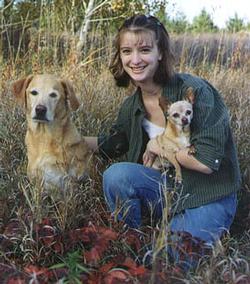
 We
were given a referral immediately to the U of M for another series of X-rays.
Their equipment is higher-powered and they took several different views.
The news was bad. In fact, it was essentially a death sentence. It was
their opinion that it indeed was osteosarcoma, and that it originated in
her shoulder joint. The tumor appeared to be located over three-fourths
of her scapula, with long tendrils of the tumor snaking along the entire
length of the bone. We
were given a referral immediately to the U of M for another series of X-rays.
Their equipment is higher-powered and they took several different views.
The news was bad. In fact, it was essentially a death sentence. It was
their opinion that it indeed was osteosarcoma, and that it originated in
her shoulder joint. The tumor appeared to be located over three-fourths
of her scapula, with long tendrils of the tumor snaking along the entire
length of the bone.
 I
really wasn't prepared for this news. I especially wasn't prepared to hear
the treatment either. The oncologist said that we basically had two choices.
One was to do nothing and to have her euthanized immediately because of
her severe pain. The second was to amputate her left front leg (for pain
control) and start chemotherapy right away. Dale was crushed with agony
over the thought of amputation. I sat there and sobbed because our beloved
dog certainly didn't deserve this and above all, didn't deserve to have
her leg removed. Dale, in typical fashion, wanted to leave. He doesn't
like dealing I
really wasn't prepared for this news. I especially wasn't prepared to hear
the treatment either. The oncologist said that we basically had two choices.
One was to do nothing and to have her euthanized immediately because of
her severe pain. The second was to amputate her left front leg (for pain
control) and start chemotherapy right away. Dale was crushed with agony
over the thought of amputation. I sat there and sobbed because our beloved
dog certainly didn't deserve this and above all, didn't deserve to have
her leg removed. Dale, in typical fashion, wanted to leave. He doesn't
like dealing
with painful situations, and all he wanted to do was get out of the
facility with his dog. I, on the other hand, wanted to know the grim details
of amputation; what it meant for her, how much the cost of the treatment
would be, and the statistical outcome.
 First
of all, the cost was above and beyond what we really could afford--in the
range of $4000-$5000 with amputation and chemotherapy included. We are
not rich, but we both have steady jobs. Carboplatin is the chemo drug of
choice, as it is nearly non-toxic to the kidneys like cisplatin was a few
years ago. The drug is a platinum derivitive and has a price tag that was
very high. I was assured that most dogs do quite well when they receive
chemo, and they do not lose their hair, and most don't get very sick. Gretchen's
size was also within the ideal range for amputation. A really heavy large
animal has difficulty maintaining their balance on only one front leg.
Gretchen's weight was 60 pounds, and the doctor was quite positive that
she would learn to compensate. Plus, she was in reasonably good condition
considering her disability. I remembered asking if they had any recent
amputees in the hospital, but after checking, she said they didn't. I wanted
to see how an animal does after amputation. Meanwhile, Dale was nearly
frantic and insisted on leaving immediately. I told the doctor I would
call her the next day with our decision. First
of all, the cost was above and beyond what we really could afford--in the
range of $4000-$5000 with amputation and chemotherapy included. We are
not rich, but we both have steady jobs. Carboplatin is the chemo drug of
choice, as it is nearly non-toxic to the kidneys like cisplatin was a few
years ago. The drug is a platinum derivitive and has a price tag that was
very high. I was assured that most dogs do quite well when they receive
chemo, and they do not lose their hair, and most don't get very sick. Gretchen's
size was also within the ideal range for amputation. A really heavy large
animal has difficulty maintaining their balance on only one front leg.
Gretchen's weight was 60 pounds, and the doctor was quite positive that
she would learn to compensate. Plus, she was in reasonably good condition
considering her disability. I remembered asking if they had any recent
amputees in the hospital, but after checking, she said they didn't. I wanted
to see how an animal does after amputation. Meanwhile, Dale was nearly
frantic and insisted on leaving immediately. I told the doctor I would
call her the next day with our decision.
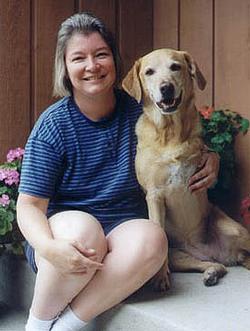  By
that evening, I had made up my mind. After checking some web sites and
seeing actual pictures of dogs with amputated limbs, I felt that Gretchen
could handle the surgery. I was willing to deal with her recovery and do By
that evening, I had made up my mind. After checking some web sites and
seeing actual pictures of dogs with amputated limbs, I felt that Gretchen
could handle the surgery. I was willing to deal with her recovery and do
what it took to get her well. The money was secondary. I had a savings
account that I rarely touch except in emergencies and I was willing to
spend that money for Gretchen's care. I also was able to take on freelance
work for extra cash. Dale felt we should put her down, as she'd had nine
really good years and it would be a disservice to maim her. He also felt
that the money was a very real issue since our daughter Cassie's college
tuition
would be due in a few years. On top of that, he was afraid of losing
his faithful hunting partner. Cassie came out of her bedroom after listening
to us cry and carry on. She's 16 and has her own ideas about things. Still
teary-eyed, she flatly stated that if she had to keep a job during college
in order to help pay for tuition, then it would be worth it to try to save
Gretchen's life. It didn't end there. That evening, Dale and I were downstairs,
continuing with the discussion as to what to do. There were more tears
and we just couldn't agree. Gretchen managed to hobble down the flight
of stairs (something she hadn't done for over a month) and she sat in front
of us, staring quietly at each of us sitting on the couch. It was as if
she had to prove to us that she still had fight left in her. I think it
was destiny. At that moment, I said that the decision was made. I was going
to schedule the surgery and that was that. I didn't even care about the
money. I'm not very emotionally attached to money anyway. Somehow
I knew it would work out. Dale was upset, and told me "Fine! You win!"
I told him it wasn't a winning situation, but I still needed his support.
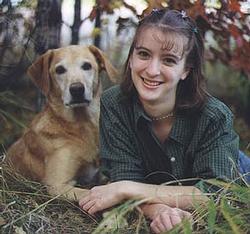  The
next morning I called the oncologist and told her that I wanted to get
Gretchen scheduled as soon as possible. She was in terrible pain and I
couldn't stand watching her suffer. She was scheduled for surgery the following
day. That evening I allowed her to sleep on our bed for the first time.
She snuggled next to me that night and I hardly slept. Getting up the next
morning was agony. I didn't want to drop her off at the University The
next morning I called the oncologist and told her that I wanted to get
Gretchen scheduled as soon as possible. She was in terrible pain and I
couldn't stand watching her suffer. She was scheduled for surgery the following
day. That evening I allowed her to sleep on our bed for the first time.
She snuggled next to me that night and I hardly slept. Getting up the next
morning was agony. I didn't want to drop her off at the University
because she was so miserable. I knew that she wasn't going to understand
why she was there. The waiting room was empty since it was very early.
One of the residents came out to get Gretchen and answer any other questions
I had. She was scheduled for amputation in the early afternoon, and the
surgeon would call me right away once he was finished. Gretchen knew something
was up, and she leaped into my lap--something she's never done. The resident
gave me a few extra moments to compose myself and talk to Gretchen. I walked
part of the way back to the exam rooms, then quickly turned and practically
ran out of there.
 Needless
to say, it was a horrible day at work. I finally left an hour early since
I hadn't yet heard from the surgeon. I waited impatiently by the phone
and finally out of desperation, called to find out how she was. As it turned
out, she hadn't been operated on until three that afternoon, and the surgeon
was still working on her. He eventually called me an hour later and told
me she was doing as well as could be expected. He said the tumor had consumed
her entire scapula and was the size of a small grapefruit. He also Needless
to say, it was a horrible day at work. I finally left an hour early since
I hadn't yet heard from the surgeon. I waited impatiently by the phone
and finally out of desperation, called to find out how she was. As it turned
out, she hadn't been operated on until three that afternoon, and the surgeon
was still working on her. He eventually called me an hour later and told
me she was doing as well as could be expected. He said the tumor had consumed
her entire scapula and was the size of a small grapefruit. He also
mentioned that it was highly vascular and the cells were multiplying
rapidly under the
microscope. The other oncologists agreed that it was surely osteosarcoma,
and not another type of cancer. The surgeon also told me that because of
the high incidence of bleeding, there was a good chance that at least a
few cells would have been left behind, although he was sure he had removed
the entire tumor. I was not allowed to see her that night and I slept fitfully.
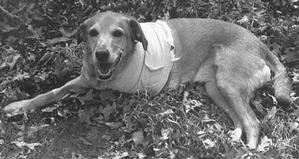  The
next morning I called around 10, and asked about her. The resident went
to check with Gretchen's attendant and came back with good news. She was
up and around, barking a little and had eaten some breakfast. We could
come and get her! I couldn't get ready quickly enough. We left immediately
and got to the University in record time. Dale was dreading seeing her...I
was just relieved that the surgery was over. Another resident brought her
out as soon as we paid the bill. I could hear her coming for a few seconds--a
sloppy slow walk down the tiled hallway. Gretchen was tightly wrapped around
her whole torso, and she was having a lot of trouble keeping her paws from
sliding on the floor. She was exhausted from the ordeal, but was so happy
to see us. I cautiously walked her outside and allowed her to urinate.
The resident showed me how to lift her up into the car. I remember a woman
running up to us in the parking lot and asking what happened. I practically
snapped the word "cancer!" at her, before lifting Gretchen into the back
seat. I didn't want anyone to see my disfigured dog, nor did I want them
asking rude questions. I just wanted to protect her and her spirit. The
next morning I called around 10, and asked about her. The resident went
to check with Gretchen's attendant and came back with good news. She was
up and around, barking a little and had eaten some breakfast. We could
come and get her! I couldn't get ready quickly enough. We left immediately
and got to the University in record time. Dale was dreading seeing her...I
was just relieved that the surgery was over. Another resident brought her
out as soon as we paid the bill. I could hear her coming for a few seconds--a
sloppy slow walk down the tiled hallway. Gretchen was tightly wrapped around
her whole torso, and she was having a lot of trouble keeping her paws from
sliding on the floor. She was exhausted from the ordeal, but was so happy
to see us. I cautiously walked her outside and allowed her to urinate.
The resident showed me how to lift her up into the car. I remember a woman
running up to us in the parking lot and asking what happened. I practically
snapped the word "cancer!" at her, before lifting Gretchen into the back
seat. I didn't want anyone to see my disfigured dog, nor did I want them
asking rude questions. I just wanted to protect her and her spirit.
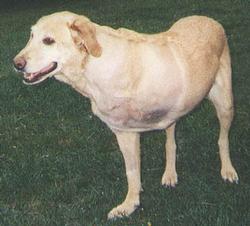  I
spent the weekend watching her closely and caring for her. Dale was non-committal,
but did pet her and talk to her. On the other hand, Cassie and I nurtured
her and tended to her when she had to go outside. We placed rugs all over
the smooth floors in the house so she wouldn't slip. However, by Monday,
I was starting to realize something was wrong. Gretchen was severely depressed
over the loss of her limb. She couldn't figure out why she'd fall on a
few steps or why it was so difficult to move around. She didn't care about
eating, playing or chewing on rawhides--one of her favorite pastimes. I
figured I was just pushing her too hard and that she was probably in great
pain, although she never whimpered even once. I know I hurt her on occasion
when I had to lift her, but she never complained. I think she knew I was
rooting for her recovery. I
spent the weekend watching her closely and caring for her. Dale was non-committal,
but did pet her and talk to her. On the other hand, Cassie and I nurtured
her and tended to her when she had to go outside. We placed rugs all over
the smooth floors in the house so she wouldn't slip. However, by Monday,
I was starting to realize something was wrong. Gretchen was severely depressed
over the loss of her limb. She couldn't figure out why she'd fall on a
few steps or why it was so difficult to move around. She didn't care about
eating, playing or chewing on rawhides--one of her favorite pastimes. I
figured I was just pushing her too hard and that she was probably in great
pain, although she never whimpered even once. I know I hurt her on occasion
when I had to lift her, but she never complained. I think she knew I was
rooting for her recovery.
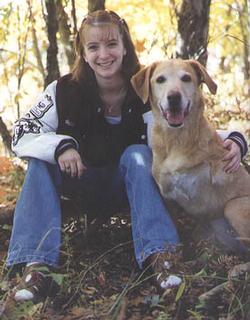  Four
days after surgery, Gretchen received her first chemo treatment. It was
rather uneventful, and they allowed me to pick her up only an hour after
receiving the drug. Lucky for me, I work very close to the University and
I could quickly run over there and drop her off or pick her up. I was also
extremely fortunate in another way. My boss allowed me to bring her to
work with me every day. He knew I would be worrying all day and my productivity
would go down if I couldn't concentrate. The easiest way around that would
be to bring the dog to work and I could feel more comfortable. I am a graphic
designer and my office was out of the way of the normal flow of clients,
so she wasn't really a problem. Gretchen was ecstatic to ride into the
city every day. It became routine--as I got ready to leave, she'd hobble
over to the door and wait for me to leave. At work, she was pampered by
the other employees and got plenty of treats and petting. My clients were
all sympathetic and hopeful for her recovery. On the way home, we'd always
stop at a park, a lake, or a wild area and she would run around a bit. Her
stamina was reduced and she could only take maybe 50 steps before resting,
but it didn't matter. She looked forward to every day and those stops afterward.
To see her recovering little by little always brought a smile to my face. Four
days after surgery, Gretchen received her first chemo treatment. It was
rather uneventful, and they allowed me to pick her up only an hour after
receiving the drug. Lucky for me, I work very close to the University and
I could quickly run over there and drop her off or pick her up. I was also
extremely fortunate in another way. My boss allowed me to bring her to
work with me every day. He knew I would be worrying all day and my productivity
would go down if I couldn't concentrate. The easiest way around that would
be to bring the dog to work and I could feel more comfortable. I am a graphic
designer and my office was out of the way of the normal flow of clients,
so she wasn't really a problem. Gretchen was ecstatic to ride into the
city every day. It became routine--as I got ready to leave, she'd hobble
over to the door and wait for me to leave. At work, she was pampered by
the other employees and got plenty of treats and petting. My clients were
all sympathetic and hopeful for her recovery. On the way home, we'd always
stop at a park, a lake, or a wild area and she would run around a bit. Her
stamina was reduced and she could only take maybe 50 steps before resting,
but it didn't matter. She looked forward to every day and those stops afterward.
To see her recovering little by little always brought a smile to my face.
 Once,
during that first week, I stopped by her favorite park. She leaped out
of the car and ran about 20 steps. When she turned to me, I noticed with
alarm that she was bleeding profusely from her incision. Her stitches were
still intact, but the blood was coming out so fast that I couldn't stop
the spurting, even with pressure. Frantic, I phoned my home to see if anyone
was there, but no one was around. I then called the University and asked
to speak to a doctor. By this time, the blanket in my car was soaked with Once,
during that first week, I stopped by her favorite park. She leaped out
of the car and ran about 20 steps. When she turned to me, I noticed with
alarm that she was bleeding profusely from her incision. Her stitches were
still intact, but the blood was coming out so fast that I couldn't stop
the spurting, even with pressure. Frantic, I phoned my home to see if anyone
was there, but no one was around. I then called the University and asked
to speak to a doctor. By this time, the blanket in my car was soaked with
blood and I was panicking. However, the surgeon assured me that it
was most likely
a pocket of serous fluid and that it would continue to leak out until
the pocket was empty. After an hour of draining, the bloody fluid suddenly
stopped flowing. Weak with relief, I loaded her back into the car, but
I was a little perturbed that no one had ever mentioned the possibility
of this happening.
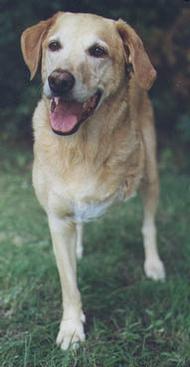  Two
weeks after surgery, our family left the country for a 12-day trip to Europe.
We had saved for two years and had pre-paid nearly everything. Originally,
I was not going to go through with it, but my brother Eric and his wife
Mary assured me that they would take good care of Gretchen while she recovered,
and they'd also take our Chihuahua, Heidi. Convinced that she was in good
hands, but still worried, we left for our much-planned-for trip. My main
concern was that the chemo would affect her while we were gone, and she'd
have to be hospitalized. However, everything went well, with the exception
of one day where Gretchen did not eat or drink for nearly 18 hours. Eric
and Mary brought her to the University and had her thoroughly checked.
Gretchen decided at that time that it would be better to eat and drink
rather than spend the night there, so they released her once she cooperated.
Meanwhile, her blood tests looked good. All went well the rest of the time
we were away, and homecoming was a sweet event. Two
weeks after surgery, our family left the country for a 12-day trip to Europe.
We had saved for two years and had pre-paid nearly everything. Originally,
I was not going to go through with it, but my brother Eric and his wife
Mary assured me that they would take good care of Gretchen while she recovered,
and they'd also take our Chihuahua, Heidi. Convinced that she was in good
hands, but still worried, we left for our much-planned-for trip. My main
concern was that the chemo would affect her while we were gone, and she'd
have to be hospitalized. However, everything went well, with the exception
of one day where Gretchen did not eat or drink for nearly 18 hours. Eric
and Mary brought her to the University and had her thoroughly checked.
Gretchen decided at that time that it would be better to eat and drink
rather than spend the night there, so they released her once she cooperated.
Meanwhile, her blood tests looked good. All went well the rest of the time
we were away, and homecoming was a sweet event.
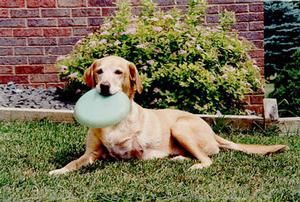  My
theory on her recovery was starting to take shape. Gretchen figured out
quickly that if she got my attention by woofing or whining, she got something
in return. I would literally drop everything to either play with her, or
give her a massage, or just talk to her. She became incredibly spoiled
and I loved doing it! When she finally picked up her frisbee and brought
it to me, I nearly cried with joy. Frisbee had been her favorite game,
and she had not really attempted to run after it again. I started by tossing
it a few feet right at her. I kept adding to the distance by stepping back
a bit, then tossing it. When her chemo treatments ended nine weeks later,
her endurance improved, and she was able to run a little without expending
as much energy. My
theory on her recovery was starting to take shape. Gretchen figured out
quickly that if she got my attention by woofing or whining, she got something
in return. I would literally drop everything to either play with her, or
give her a massage, or just talk to her. She became incredibly spoiled
and I loved doing it! When she finally picked up her frisbee and brought
it to me, I nearly cried with joy. Frisbee had been her favorite game,
and she had not really attempted to run after it again. I started by tossing
it a few feet right at her. I kept adding to the distance by stepping back
a bit, then tossing it. When her chemo treatments ended nine weeks later,
her endurance improved, and she was able to run a little without expending
as much energy.
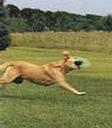  Soon
she was back to her usual self, "talking" to us and bouncing around asking
for attention. We took her everywhere with us and some people were really
shocked at her appearance. She became a regular mascot at Cassie's softball
games, drawing crowds of people to stare at her. Gradually I got used to
the looks, and I didn't care that they stared. At least she didn't feel
isolated by her disability. Soon
she was back to her usual self, "talking" to us and bouncing around asking
for attention. We took her everywhere with us and some people were really
shocked at her appearance. She became a regular mascot at Cassie's softball
games, drawing crowds of people to stare at her. Gradually I got used to
the looks, and I didn't care that they stared. At least she didn't feel
isolated by her disability.
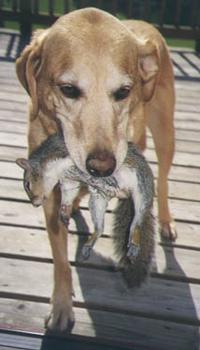  By
this time, Dale was coming around to the fact that we might not lose her
immediately. Instead of shunning her, he was now paying more attention
to her and was playing with her whenever she asked. He started talking
of the upcoming hunting season and actually thought that she might be a
willing partner again. Why not? She only had three legs, but that didn't
stop her enthusiasm. He'd just have to plan a few extra rest stops. She
was already proving herself by chasing the squirrels out of the bird feeders
every morning. She became nimble at their dodging tactics, and even though
her gait was a bit clumsy, she actually got lucky enough to catch one.
Of course, we told her what a good girl she was and she proudly carried
the squirrel around for an hour until rigor mortis set in and we had to
take it away from her! By
this time, Dale was coming around to the fact that we might not lose her
immediately. Instead of shunning her, he was now paying more attention
to her and was playing with her whenever she asked. He started talking
of the upcoming hunting season and actually thought that she might be a
willing partner again. Why not? She only had three legs, but that didn't
stop her enthusiasm. He'd just have to plan a few extra rest stops. She
was already proving herself by chasing the squirrels out of the bird feeders
every morning. She became nimble at their dodging tactics, and even though
her gait was a bit clumsy, she actually got lucky enough to catch one.
Of course, we told her what a good girl she was and she proudly carried
the squirrel around for an hour until rigor mortis set in and we had to
take it away from her!
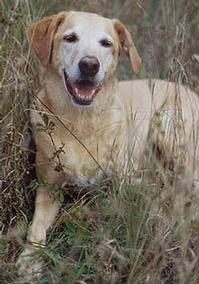  Dale
took her bird hunting every weekend for two months. I was a bit apprehensive,
but my fears were not warranted. She was every bit the hunting dog she'd
always been and Dale was thrilled with her enthusiasm. He'd try to make
her rest, but she would have nothing of it, instead hopping along and flushing
grouse for him. She was in her glory and my heart melted with love as he
would call me with stories about her finding a wounded bird or making a
difficult flush. Sure, she was tired after a few miles of running through
the woods, but looking at her now, it's hard to believe that she was once
so close to death. I knew deep down that she wasn't a quitter and that
this was the right decision for all of us. Dale
took her bird hunting every weekend for two months. I was a bit apprehensive,
but my fears were not warranted. She was every bit the hunting dog she'd
always been and Dale was thrilled with her enthusiasm. He'd try to make
her rest, but she would have nothing of it, instead hopping along and flushing
grouse for him. She was in her glory and my heart melted with love as he
would call me with stories about her finding a wounded bird or making a
difficult flush. Sure, she was tired after a few miles of running through
the woods, but looking at her now, it's hard to believe that she was once
so close to death. I knew deep down that she wasn't a quitter and that
this was the right decision for all of us.
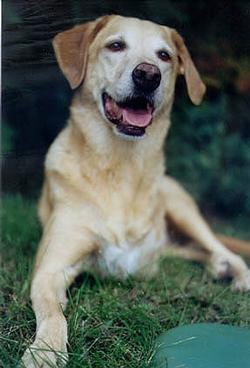  Still,
the surgeon's words ring in my head every now and then. After one checkup
early on, he told me that Gretchen will die from this disease. If there's
one silver lining, it's that her cancer was so vicious and was multiplying
so rapidly. Chemotherapy tends to work better against more aggressive cancers.
I try not to think of his words and each morning I look at my dog with
thanks that she'll be here for at least one more day. She owes her life
to me. I owe my life to her. She's made me a better person overall--more
accepting, more patient, more hopeful. I'd like to think that she's actually
beaten the cancer, but I know that may not be the case. But for now, seven
months after surgery and diagnosis, she's alive and very much a part of
our family. For that, I have medical science and lots of love and friendship
to thank. Still,
the surgeon's words ring in my head every now and then. After one checkup
early on, he told me that Gretchen will die from this disease. If there's
one silver lining, it's that her cancer was so vicious and was multiplying
so rapidly. Chemotherapy tends to work better against more aggressive cancers.
I try not to think of his words and each morning I look at my dog with
thanks that she'll be here for at least one more day. She owes her life
to me. I owe my life to her. She's made me a better person overall--more
accepting, more patient, more hopeful. I'd like to think that she's actually
beaten the cancer, but I know that may not be the case. But for now, seven
months after surgery and diagnosis, she's alive and very much a part of
our family. For that, I have medical science and lots of love and friendship
to thank.
 UPDATE - - THE FINAL DAYS: On April 22, 2001, just two days shy of her two-year
remission mark, Gretchen suddenly developed an alarming weakness in her
hind legs. We rushed her into the emergency room at the U of M, where they
took x-rays and did a full neurological exam. The x-rays did not reveal
the spread of cancer, nor did they indicate any spinal abnormalities. Still,
without further diagnostic testing, the doctors could not rule out any
of these potential problems. Since treatment would be the same in any case,
she was put on a substantial dose of prednisone twice daily to help reduce
any inflammation. Over the next five days, her condition remained stable,
although not greatly improved. Still, she was able to move around reasonably
well, and with us carrying her outside so as to avoid stairs, she could
maintain daily functions. When the prednisone was tapered off on the sixth
day, she declined drastically and had to be put back on the higher dose.
She initially bounced back a bit, but soon her condition started to worsen,
and on May 7, she lost most of her motor function entirely. Though her
personality still shined, and her tail continued to wag, she was
starting to suffer other pains. She would yelp when we lifted her, and
she could no longer eliminate while standing. No longer able to watch her
suffer, on May 10, 2001, Gretchen was humanely euthanized at home while
lying in the loving arms of her family.
UPDATE - - THE FINAL DAYS: On April 22, 2001, just two days shy of her two-year
remission mark, Gretchen suddenly developed an alarming weakness in her
hind legs. We rushed her into the emergency room at the U of M, where they
took x-rays and did a full neurological exam. The x-rays did not reveal
the spread of cancer, nor did they indicate any spinal abnormalities. Still,
without further diagnostic testing, the doctors could not rule out any
of these potential problems. Since treatment would be the same in any case,
she was put on a substantial dose of prednisone twice daily to help reduce
any inflammation. Over the next five days, her condition remained stable,
although not greatly improved. Still, she was able to move around reasonably
well, and with us carrying her outside so as to avoid stairs, she could
maintain daily functions. When the prednisone was tapered off on the sixth
day, she declined drastically and had to be put back on the higher dose.
She initially bounced back a bit, but soon her condition started to worsen,
and on May 7, she lost most of her motor function entirely. Though her
personality still shined, and her tail continued to wag, she was
starting to suffer other pains. She would yelp when we lifted her, and
she could no longer eliminate while standing. No longer able to watch her
suffer, on May 10, 2001, Gretchen was humanely euthanized at home while
lying in the loving arms of her family.
We are grateful for the two happy, healthy additional years we had
with her, and her spirit will always continue to shine and inspire those
who face the same dreadful disease she did. The void in our lives is immense,
but we cannot forget what an incredibly special dog she was and for that,
we are eternally grateful.
|
![]()
![]()
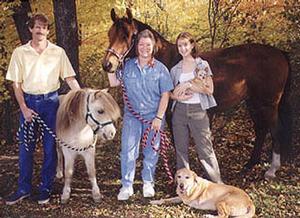
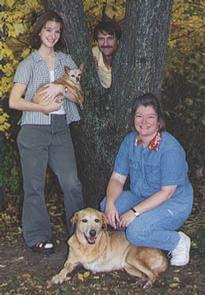

![]()


